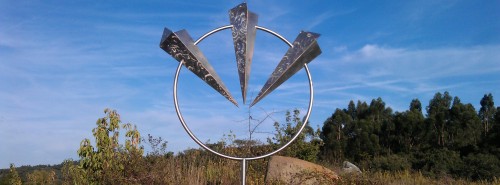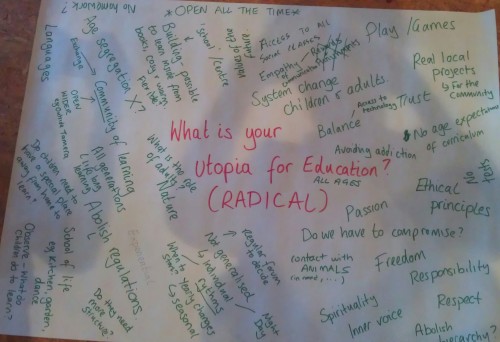Are we being radical enough?
I attended the First International Education Symposium at Tamera in Southern Portugal from the 3-6th October 2013 intrigued by what a gathering of passionate educators would create over a long weekend. Passion was a key word everyone there was striving to improve what education was available for children and young people. Following on from my last post on compromise this was a key term as many people were stuck (or liberated) by the struggle of the expectations of society, their government’s laws (particularly relating to allowing or not allowing home education, compulsory tests, school starting age) as well as where does the funding come from for alternative schools and if its the government or local council then what conditions are attached?
Politics played an important role in the line up of speakers and in the approach of questioning acknowledged by Oskar Eckmann, the developer of the holistic learning concept in Tamera when he quoted Paul Frere, “There is no other but political pedagogy.” Tamera community was set up by German expats 25 years ago with a clear vision for peace. Children are very important and have their own area ‘The place of the children’ where the Escola da Esperanca, School of Hope, currently teaches Primary aged children using many child led and Montessori inspired approaches and hopes to become an International Primary and Secondary school recognised by the Portuguese government. So the local Deputy Mayor and Area Schools Headteacher spoke of the future of sharing the creativity of Tamera with the Portugeuse language immersion from the local schools. Politically this compromise makes sense. Tamera is allowed to offer schooling for its children and local children using its vision and approaches but combining it with government expectations such as set tests and cooperation with the wider community. Hearing this and acknowledging key concepts of Escola da Esperanca from their film makes me wary. Is this possible? If ‘fear prevents real learning’ as they state then why are they still agreeing to compulsory tests or what learning can be shared of their creativity in approaching these tests?
The tag line of this conference was ‘A new world needs new schools,’ and through these talks profound, moving statements were made. Vera from Tamera expressed the need that children, “have to decide it is worth growing up…to think it’s cool to be an adult!” and adults should accompany children to be as independent as possible, to empathsise the individuality of each child and recognise that they are growing in knowledge rather than learning answers to get good grades. She also stressed the importance of being exposed to lots of languages and cultures to realise we all live on the planet as one. Strong words and is the Escola da Esperanca doing this? The evidence from the confidence, world knowing and vision of the group of late teens who went through the first school at Tamera who only had two years at the local school to do their exams suggests it worked, particularly the freedom and the time spent abroad. First as 12 year olds in Israel Palestine and then inspired by their trip, writing a play about child soldiers which they learnt in Spanish and then took on tour to Columbia. Powerful, life changing experiences. One 16 year old from the community expressed the desire to be taught by adults that she could trust. Ones that do their jobs fully and out of joy. She said she had done here IGCSEs but the course had been boring she wants learning for real life not to forget… A clear message from the conference to remind educators to listen to young people and find out what they want to know and how they want to learn.
Listening to the small, humble Jose Pacheco speak was life affirming. Here really was a man who had lived the talk of bringing radical education not just to the common school of Portugal but also to the slums of Brazil. His stories, his deep empathy for the people he worked with brought a respectful hush to the auditorium and tears to many. His key message that really resonated with me was state education is using 19th century methods, taught by 20th century born and educated teachers to 21st century children and this now is a barrier to human development. He stressed the importance of a need for a dialogue to create communities of learning. Reminding us that there was NOT one way. Pacheco, worked within the Escola da Ponte in Porto, Portugal with two other colleagues to make changes from the inside by respecting the state and creating autonomy from the inside. He recognised that this was hard especially as a teacher taught by the old system but those in a team suffer less and the difference of his vision to the 19th century is that teaching is a SOLIDARY act NOT a SOLITARY act. He also talked about the role of the teacher to learn with the children not to manage them, also not agreeing with grades as they are useless as they can damage and compare people, and his concern that schools are managed by hierarchy (even in which toilet you can use) and bureaucracy rather than pedagogy. From my discussions with other confrence participants that had visited the Escola da Ponte it seems that it continues to thrive but has had many challenges from the Portugeuse government and had to make compromises. Pacheco now works in at Project Ancora in Brazil having an opportunity to really work at community building and alternative education. Here the students develop their own research projects supported by teachers. His story shows me that change making is not an easy journey but perseverance can transform many children lives.
The conference continued…people talked about inspiring work. In Kenya, Dr. Karambu Ringera, explained her work with education to empower women, in Mexico, Roberto Sanches and Nadia Marquez spoke of their work in an area of conflict offering alternative education and hope to the children. We heard of an exciting open space approach in an old castle in Austria, Lernwerkstatt, where 100 children from 6-15 have self guided active learning. Here there are no schedules, no marks, no pressure, no motivation system, no classes only spaces. This work is inspired by Montessori but also by educationalists Rebeca and Maurice Wild who ran an enriched Montessori school in Ecuador called Pesca. The school also uses non violent communication. I would like to visit here as it excites me that many of my educational ideals are being combined in a state school. In Switzerland, a project of after school enrichment called Tuftellabor allowed children to turn up and go as they pleased and choose from a wide variety of practical and creative activities from knitting to science to ICT. Also in Switzerland the Sol school offers open learning for students that do not fit in the school system such as those with Autism, Aspergers or ADHD within a democratic approach such as regular meetings, shared meals and a weekly forum creating a diverse, inclusive and open community.
In keeping with the openness and clear communication of the Tamera community most days there was time for a ‘forum’ where anyone could ask questions, share experiences or make a statement. My own inner dialogue of the issue of over compromise with the governing systems and its influence on the type and style of school gave me the courage to stand up and speak. I asked,
“Are we being radical enough? Why are we still using the term ‘school?’ If a new world needs new schools then why are we compromising with the old system why are we not revisioning education?”
I was asked what was my vision? I spoke of my dream for community learning, beautiful eco buildings (like the yurt I built in 2011) with access to nature and adults with passion for their lives.
A flurry of people came to talk to me because I had just asked a question on many people’s minds. Theresa Mendes, from Lisbon, Manager of the Florescer project, a home school support group talked to me of her passion for alternative education, her MA in Progressive Education and her choice to home educate her daughter as no radical school was available. Together we decided to lead a workshop looking at ‘Utopias for Education, ideas of how they could be practically implemented and networking across Portugal.’
Our workshop felt very insightful for me as it highlighted the challenges of visioning for a utopian, radical school with a group of ‘alternative’ educators who themselves hold differing views on what is radical, from unschooling to formal but alternative approaches like Steiner Waldorf, to not being upset by the concept of grades and homework to an abhorrent objection. Also cultural issues appeared so personal actually quite ‘English’ issues like the young school starting age and uniform were not important to others as they start school later and don’t wear uniform in their country. Lucky really that we were not trying to create a new dogma of one alternative school fits all. It made me want to visit more schools and to carry on this visioning discussion with others.
Reflecting on my notes from the conference I see that some of my questions had begun to be answered particularly by the German academic Prof Dr Olaf-Axel Burrow with his paper defining school. School as a place where happiness is key, each young person driven by their own passions and life purpose, celebrating the diversity of people not a school being somewhere that tries to teach all children to fit the same norms, a place driven by self determination theory (inner motivation) and where teachers, students and parents are united. Oskar Eckmann, added more to the definition of the role of the teacher, as the choreographer of energy movement and that a school’s ideals are to be based on sustainability, non violent technology, community knowledge, cooperation, communication with animals, art, theatre, music, dance, different cultures and native language speakers as well as cooperation with the wider community. Paula Soares, from Evora University, Portugal spoke for revisioning higher education and the positive outcomes of eco village learning creating a global university for example Findhorn Community in NE Scotland is already offering this.
So what next? I continue my journey, as I agree, A NEW EARTH NEEDS NEW SCHOOLS, so those passionate about alternative education need to network, share experiences and find ways to move away from using 19th century teaching methods with 21st century children.
For more information about the conference and projects mentioned…
Website for the community where the conference was held. http://www.tamera.org
Kenya. http://www.amanikids.org
Tuftel Labor, Switzerland. http://www.tueftellabor-einstein.ch/tueftellabor.html
Austria open learning http://www.lernwekstatt.at
http://www.spiel-und-lernzentrum.ch/pild1.html
http://florescer.pt
You tube linkt to Mexican project Pi pao angelito de los ninos http://www.youtube.com/watch?v=Y_BcaOOHJhs
http://www.findhorn.org
http://www.olaf-axel-burow.de
http://www.guninetwork.org/portal_memberdata/psoares



Leave a comment